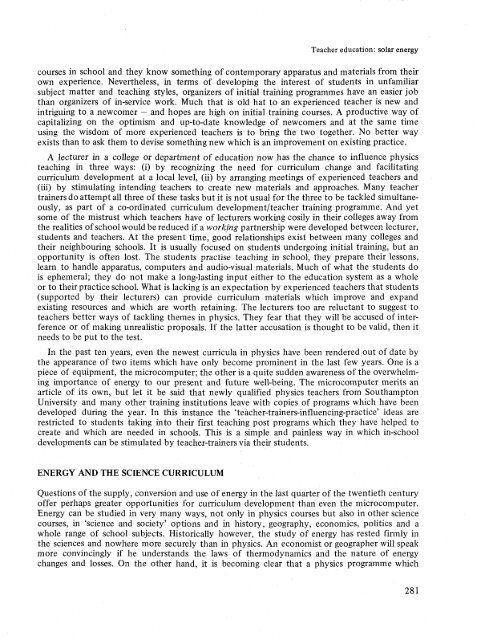New trends in physics teaching, v.4; The ... - unesdoc - Unesco
New trends in physics teaching, v.4; The ... - unesdoc - Unesco
New trends in physics teaching, v.4; The ... - unesdoc - Unesco
Create successful ePaper yourself
Turn your PDF publications into a flip-book with our unique Google optimized e-Paper software.
Teacher education: solar energy<br />
courses <strong>in</strong> school and they know someth<strong>in</strong>g of contemporary apparatus and materials from their<br />
own experience. Nevertheless, <strong>in</strong> terms of develop<strong>in</strong>g the <strong>in</strong>terest of students <strong>in</strong> unfamiliar<br />
subject matter and teach<strong>in</strong>g styles, organizers of <strong>in</strong>itial tra<strong>in</strong><strong>in</strong>g programmes have an easier job<br />
than organizers of <strong>in</strong>-service work. Much that is old hat to an experienced teacher is new and<br />
<strong>in</strong>trigu<strong>in</strong>g to a newcomer - and hopes are high on <strong>in</strong>itial tra<strong>in</strong><strong>in</strong>g courses. A productive way of<br />
capitaliz<strong>in</strong>g on the optimism and up-to-date knowledge of newcomers and at the same time<br />
us<strong>in</strong>g the wisdom of more experienced teachers is to br<strong>in</strong>g the two together. No better way<br />
exists than to ask them to devise someth<strong>in</strong>g new which is an improvement on exist<strong>in</strong>g practice.<br />
A lecturer <strong>in</strong> a college or department of education now has the chance to <strong>in</strong>fluence <strong>physics</strong><br />
teach<strong>in</strong>g <strong>in</strong> three ways: (i) by recogniz<strong>in</strong>g the need for curriculum change and facilitat<strong>in</strong>g<br />
curriculum development at a local level, (ii) by arrang<strong>in</strong>g meet<strong>in</strong>gs of experienced teachers and<br />
(iii) by stimulat<strong>in</strong>g <strong>in</strong>tend<strong>in</strong>g teachers to create new materials and approaches. Many teacher<br />
tra<strong>in</strong>ers do attempt all three of these tasks but it is not usual for the three to be tackled simultaneously,<br />
as part of a co-ord<strong>in</strong>ated curriculum development/teacher tra<strong>in</strong><strong>in</strong>g programme. And yet<br />
some of the mistrust which teachers have of lecturers work<strong>in</strong>g cosily <strong>in</strong> their colleges away from<br />
the realities of school would be reduced if a work<strong>in</strong>g partnership were developed between lecturer,<br />
students and teachers. At the present time, good relationships exist between many colleges and<br />
their neighbour<strong>in</strong>g schools. It is usually focused on students undergo<strong>in</strong>g <strong>in</strong>itial tra<strong>in</strong><strong>in</strong>g, but an<br />
opportunity is often lost. <strong>The</strong> students practise teach<strong>in</strong>g <strong>in</strong> school, they prepare their lessons,<br />
learn to handle apparatus, computers and audio-visual materials. Much of what the students do<br />
is ephemeral; they do not make a long-last<strong>in</strong>g <strong>in</strong>put either to the education system as a whole<br />
or to their practice school. What is lack<strong>in</strong>g is an expectation by experienced teachers that students<br />
(supported by their lecturers) can provide curriculum materials which improve and expand<br />
exist<strong>in</strong>g resources and which are worth reta<strong>in</strong><strong>in</strong>g. <strong>The</strong> lecturers too are reluctant to suggest to<br />
teachers better ways of tackl<strong>in</strong>g themes <strong>in</strong> <strong>physics</strong>. <strong>The</strong>y fear that they wil be accused of <strong>in</strong>terference<br />
or of mak<strong>in</strong>g unrealistic proposals. If the latter accusation is thought to be valid, then it<br />
needs to be put to the test.<br />
In the past ten years, even the newest curricula <strong>in</strong> <strong>physics</strong> have been rendered out of date by<br />
the appearance of two items which have only become prom<strong>in</strong>ent <strong>in</strong> the last few years. One is a<br />
piece of equipment, the microcomputer; the other is a quite sudden awareness of the overwhelm<strong>in</strong>g<br />
importance of energy to our present and future well-be<strong>in</strong>g. <strong>The</strong> microcomputer merits an<br />
article of its own, but let it be said that newly qualified <strong>physics</strong> teachers from Southampton<br />
University and many other tra<strong>in</strong><strong>in</strong>g <strong>in</strong>stitutions leave with copies of programs which have been<br />
developed dur<strong>in</strong>g the year. In this <strong>in</strong>stance the ‘teacher-tra<strong>in</strong>ers-<strong>in</strong>fluenc<strong>in</strong>g-practice’ ideas are<br />
restricted to students tak<strong>in</strong>g <strong>in</strong>to their first teach<strong>in</strong>g post programs which they have helped to<br />
create and which are needed <strong>in</strong> schools. This is a simple and pa<strong>in</strong>less way <strong>in</strong> which <strong>in</strong>-school<br />
developments can be stimulated by teacher-tra<strong>in</strong>ers via their students.<br />
ENERGY AND THE SCIENCE CURRICULUM<br />
Questions of the supply, conversion and use of energy <strong>in</strong> the last quarter of the twentieth century<br />
offer perhaps greater opportunities for curriculum development than even the microcomputer.<br />
Energy can be studied <strong>in</strong> very many ways, not only <strong>in</strong> <strong>physics</strong> courses but also <strong>in</strong> other science<br />
courses, <strong>in</strong> ‘science and society’ options and <strong>in</strong> history, geography, economics, politics and a<br />
whole range of school subjects. Historically however, the study of energy has rested firmly <strong>in</strong><br />
the sciences and nowhere more securely than <strong>in</strong> <strong>physics</strong>. An economist or geographer wil speak<br />
more conv<strong>in</strong>c<strong>in</strong>gly if he understands the laws of thermodynamics and the nature of energy<br />
changes and losses. On the other hand, it is becom<strong>in</strong>g clear that a <strong>physics</strong> programme which<br />
28 1
















